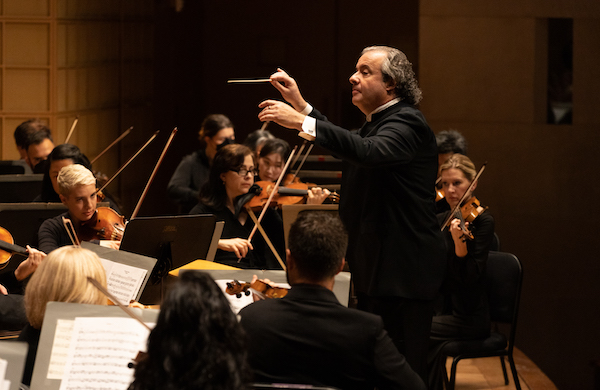A pair of debuts sparks the DSO’s mostly French program

This weekend’s Dallas Symphony Orchestra program was billed as “Ravel and Debussy,” so, it began with—you guessed it!—a Haydn symphony.
No. 44 in E minor (“Trauer-Symphonie”) to be exact. While the promised Ravel and Debussy works did indeed make an appearance—Ravel’s Piano Concerto in G and Debussy’s Ibéria—there was also music of Ginastera, his Variaciones Concertantes, making for somewhat incoherent programming.
That said, the Haydn, however inexplicable, was mostly well-played under the baton of Spanish conductor Juanjo Mena in his DSO debut. This “Mourning” symphony, from the composer’s “Sturm und Drang era, is a dark concert opener. Still, the first violins were consistently clean and crisp, even with fairly large sections, although the seconds were not always together. Mena coaxed beautiful phrasing out of the orchestra—the third movement in particular, a contemplative Adagio. The final movement, a remarkably gloomy presto, was relatively tight except for those lagging second violins. This repertoire has not historically been the DSO’s strength, but it’s beginning to appear that those days are behind them.
Ravel’s Concerto in G major was performed by pianist Javier Perianes, also making his first appearance with the DSO. The concerto could not be more contrasting in character from the Haydn. The spicy first movement, a Gershwin-esque, jazz-infused romp with plenty of percussion, was fun but, as performed Thursday night, not completely convincing. What should have been a delight seemed a bit lackluster.
The first movement segues into the crystalline slow movement, with its lengthy opening piano solo. Maintaining the melodic line of this introduction is a formidable challenge, and Perianes was for the most part up to it. At last, the orchestra enters, and treated us Thursday to a warm, golden flute solo by Hayley Grainger and a hauntingly gorgeous English horn solo by David Matthews.
The frenetic third movement, marked presto, brings us back to jazz, and showed that Perianes is more than capable of the virtuosity of this movement. This Ravel concerto shows off the pianist’s entire skill set, and for the most part, Perianes delivered.
Ginastera’s Variaciones Concertantes has as its calling card a focus on solos by principal players of a variety of instruments, allowing sometimes-overlooked instruments to be featured. The variations incorporate flavors from Ginastera’s native Argentina, which resulted in an enthusiastic audience response. The opening features excellent solos by harpist Emily Levin, and cellist Christopher Adkins, segueing into top-notch solos on viola by Meredith Kufchak, violin by Nathan Olson, and bass by Nicolas Tsolainos, among others. For this repertoire, Mena has a loose, relaxed conducting style suitable to the repertoire.
The program ended with Debussy’s Ibéria. The three programmatic movements describe a night and morning in Spain. Debussy himself apparently experienced neither, having made only a single day trip to Spain for a bullfight. Nevertheless, the three movements are full of Spanish influences, from instruments such as castanets, to Latin rhythms, to Moorish tunes. The DSO, again, has not historically excelled in French music, but as with classical repertoire, they seem to have put the past behind them and delievered a performance Thursday night that was brilliant, virtusoic and a lot of fun.
One quibble: the lack of risers at this weekend’s concerts makes it difficult for audiences on the orchestra floor to see—and often hear—anything but strings. Balance is probably better in the balconies, but seemed lacking in what are some of the most expensive seats in the hall.
The program will be repeated 7:30 Friday and 3 p.m. Sunday. dallassymphony.org.